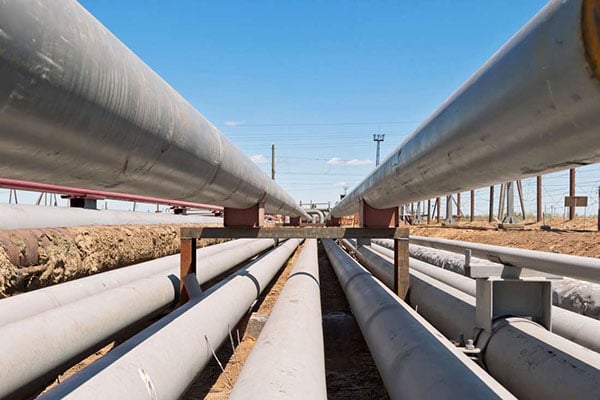The East African crude oil pipeline (EACOP) has faced opposition from a number of banks and insurance companies, with Standard Chartered being the most recent.
According to a statement by a Standard Chartered representative, the bank is not supporting the East Africa crude oil pipeline project.
The project will see crude oil transported along a 1,443-kilometer heated pipeline operated by French major TotalEnergies, stretching from Hoima in Uganda to Tanga on Tanzania’s coast, with the first exports slated for 2025.
According to the Stop EACOP campaign group, more than 45 banks and insurers, including Citi, HSBC, and Munich Re, have so far ruled out supporting the project.
The group claims that the Industrial and Commercial Bank of China (ICBC), SMBC, and Standard Bank are all still involved as financial advisors. ICBC and SMBC did not immediately respond to a request for comment.
A spokesperson for Standard Bank says that it is among potential lenders, it is internally reviewing a recent update of an independent environmental and social (E&S) due diligence report, and its “final assessment and subsequent decision will follow the project timeframes.”
“Standard Bank’s participation in the funding of the EACOP project remains subject to its credit approval process, which includes consideration of the findings of the E&S due diligence assessments and meeting the Equator Principles requirements [the banking sector’s framework for assessing environmental and social risk when financing large projects]. It is also subject to a full assessment of the EACOP sponsors’ climate change strategies and targets,” the spokesperson says.
“Standard Bank is committed to maximizing opportunities for sustainable and inclusive growth across the continent and managing the risks posed by climate change,” they add.
The pipeline has drawn criticism from numerous environmental and humanitarian groups, some of whom have organized protests at the London headquarters of banks and insurers thought to be considering backing the project.
The Climate Accountability Institute estimates that the pipeline would generate 379 million metric tons of CO2 equivalent during its 25-year lifetime, which BankTrack notes would not fit with a pathway limiting warming to 1.5°C.
The latest synthesis report from the Intergovernmental Panel on Climate Change states that even projected emissions from existing fossil fuel infrastructure would “exceed the remaining carbon budget for 1.5 °C” if further steps towards abatement are not taken.
“Standard Chartered’s decision to refuse to finance the EACOP project is a significant victory for communities impacted by this pipeline and for climate activists worldwide who have been calling for an end to fossil fuel projects that threaten people, nature, and the climate,” says Zaki Mamdoo, coordinator for the Stop EACOP campaign.
Last week, Standard Chartered, which currently chairs the Equator Principles, also updated its net-zero roadmap to include a commitment to a 29% reduction in absolute financed emissions for the oil and gas sector by 2030, as opposed to a target that uses revenue-based carbon intensity.
Alongside worries over the project’s effects on climate change, campaign groups as well as the European Parliament have also raised human rights concerns for communities in the oil extraction and pipeline areas due to disrupted livelihoods and displacement.
EACOP has provided accommodation and compensation to some of the displaced individuals, according to a statement on the organization’s website, and it will “continue to engage with the project-affected communities to ensure that their feedback is considered throughout the planning and implementation of the project.”
The EACOP project, which will collect oil upstream from the Lake Albert Development, including the Tilenga and Kingfisher projects in Uganda, is supported by those who claim it will enable that country to increase its foreign exchange reserves and take advantage of its untapped oil deposits.
Progress has thus far been made. Drilling began in the China National Offshore Oil Corporation-run Kingfisher oil field in January of this year under the leadership of Ugandan President Yoweri Museveni.

